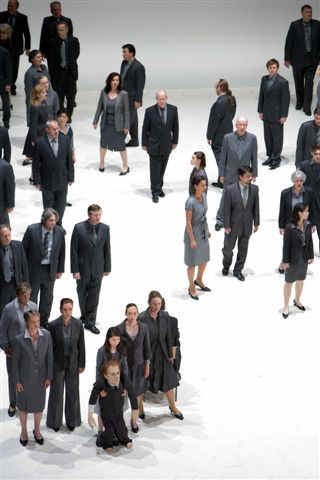Other Links
Editorial Board
- Editor - Bill Kenny
- London Editor-Melanie Eskenazi
- Founder - Len Mullenger
Google Site Search
SEEN
AND HEARD INTERNATIONAL OPERA REVIEW
Hans-Werner Henze: Die Bassariden: Bavarian State Opera, Munich Conductor: Marc Albrecht, Munich 23. 6 2008 (BM)

Based on Euripides’ tremendous myth, The Bacchae, this work
was commissioned by the Salzburger Festspiele and premiered there in
1966. It is a veritable thriller of an opera, describing the
conflict between hard-headed rationalism and sensual delight, and
the theme of mass hysteria it touches upon couldn’t be more
contemporary. In a nutshell, Pentheus, King of Thebes, endeavors to
forbid the cult of Dionysus and its followers, the Bassarids, and is
murdered by his own mother.
Naturally, it was only a matter of time before this explosive work by
Germany’s greatest living composer would be produced in Munich, one
of Europe’s leading opera houses. Henze’s music is regarded by some
as a continuation of Richard Strauss’, and indeed, if you like
Elektra and Salome, this opera is likely to be for you as
well. It is spellbinding for its tonal force and its sound
articulated in seemingly endless musical sentences, reminiscent of
the prose of Ingeborg Bachmann, Henze’s muse of long-ago. The
81-year-old composer, who has long made the Eternal City his home,
traveled to Bavaria for this special occasion, and at the premiere
party, commented that he would be going back to Italy the following
day with the feeling that he had “not lived in vain”. Who wouldn’t
be pleased to feel that sort of satisfaction one day, and Henze is
more than entitled to it!
But one can definitely be in two minds about whether Christof Loy’s
symphonic reading of this work will achieve the status of ‘landmark
production’, as the Staatsoper’s department of dramaturgy has been
quick to suggest (at an introductory lecture before the
performance). Granted, it has the merit of putting the music first,
played by an enormous version of the Bavarian State Orchestra (32
musicians in the wind section alone, not to mention pianos,
percussion, etc.) under the baton of Marc Albrecht, which brought
Henze’s enthralling score to life. Johannes Leiacker’s sets and
costumes are as minimal as they come - an exaggerated reaction
the monstrous 60’s Salzburg spectacle? - featuring the chorus
in gray togs, which give way to blindingly white underwear during
the Dionysian rites. The only hitch is that yes, this all extremely
lean and mean, riveting to the point of being scary (the little girl
dragging around an effigy of Pentheus is in this vein), but what
comes across is only the fear, not the fire – you almost have to
imagine the passion and the ecstasy. Furthermore, Loy was so
determined to include the ‘Calliope’ intermezzo deleted by Henze
after the premiere, that messengers from Munich made their way
to Rome in order to persuade the Maestro to authorize it – which he
did, against his better judgment, it would seem, since it felt like
something of a Baroque bulge tacked onto an otherwise streamlined
form.
All in all, the singers’ performances have more ‘landmark’ qualities
than the staging. First and foremost Michael Volle as an
overwhelming Pentheus, as well as Nikolai Schukoff, who sang a
mesmerizing Dionysus. The whole cast was a “crème de la crème’
selection of terrific Wagner and Strauss singers, including Gabriele
Schnaut (a celebrated Elektra) as Agave, heldentenor Reiner Goldberg
as Tiresias, luminous soprano Eir Inderhaug as Autonoe, Sami
Luttinen as Cadmus and my personal favorite, Hanna Schwarz, who lent
her luscious mezzo to the role of Pentheus’ nurse, Beroe. While the
audience were taking their seats, a video line-up of the entire
chorus was projected onto the curtain – and this was only fitting,
since if anyone stole the show it was chorus master Andrés Máspero’s
troupe, on stage almost the entire time and awe-inspiring to the
very end when the lights are cut as if by thunderbolt.
Bettina Mara
Picture © Wilfried Hösl -
published with kind permission of the Staatsoper München
Back to Top Cumulative Index Page
